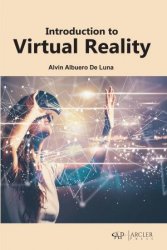Introduction to Virtual Reality
- Добавил: literator
- Дата: 24-09-2023, 01:57
- Комментариев: 0
 Название: Introduction to Virtual Reality
Название: Introduction to Virtual RealityАвтор: Alvin Albuero De Luna
Издательство: Arcler Press
Год: 2022
Страниц: 263
Язык: английский
Формат: pdf (true)
Размер: 10.2 MB
The book provides an overview of the virtual reality, along with various virtual reality systems. This book also explains the basic concepts of visual, acoustic, and haptic modality in virtual reality. It oulines the differences between Augmented Reality and Virtual Reality, with their benefits and applications. In addition to this, this book also highlights the importance of virutal reality in the coming future.
Virtual reality (VR) is a computer-generated simulation in which people can easily interact within an artificial 3D environment. The development of virtual reality is intended to give people a realistic experience inside a virtual world, by making use of technologies that influence the human brain into believing whatever they are experiencing is real. Most commonly, virtual reality is used for entertainment purposes such as 3D cinema and video games.
This book takes the readers through the brief introduction about virtual reality, focuses on history of virtual reality, types of virtual reality and its development, systems of VR, its comparison with augmented reality (AR), human beings in virtual environment (VE), benefits, and applications of VR along with its future.
The first chapter sheds light on the basic overview of the virtual reality so that the readers are clear about the fundamentals and history behind that form the utmost basics in the field. This chapter will also underline the development of virtual reality across the several years, and also explains certain pros and cons related to it.
The second chapter stresses on different systems related to virtual reality. This chapter takes the readers through different types and components of VR systems. It also focuses on comparison between immersive and non-immersive VR systems. Further, the third chapter explains visual, acoustic, and haptic perception in VR along with the key developments in VR haptics.
Then, the fourth chapter compares virtual reality with augmented reality. In the chapter, different components and devices of augmented reality are discussed. Further, certain applications, advantages, and disadvantages are explained towards the end.
The fifth chapter further focuses on how human beings experience in virtual environment. It explains the impact of VR technology on human lives and the efficiency of human performance in virtual world, along with the positives and negatives of escaping to virtual reality.
The sixth chapter explains different technologies in virtual reality, tracking of different gestures. The chapter also discusses binaural audio for virtual and augmented reality and comparing touch-based and head-tracking navigation techniques in a virtual reality. Then, the seventh chapter focuses on several benefits and applications associated with virtual reality in various fields or sectors such as healthcare, talent development, tourism, etc.
In the last chapter, this book emphasizes on the future of virtual reality in different fields. Also, this chapter explains future challenges associated with virtual reality and its development.
Скачать Introduction to Virtual Reality
Внимание
Уважаемый посетитель, Вы зашли на сайт как незарегистрированный пользователь.
Мы рекомендуем Вам зарегистрироваться либо войти на сайт под своим именем.
Уважаемый посетитель, Вы зашли на сайт как незарегистрированный пользователь.
Мы рекомендуем Вам зарегистрироваться либо войти на сайт под своим именем.
Информация
Посетители, находящиеся в группе Гости, не могут оставлять комментарии к данной публикации.
Посетители, находящиеся в группе Гости, не могут оставлять комментарии к данной публикации.
